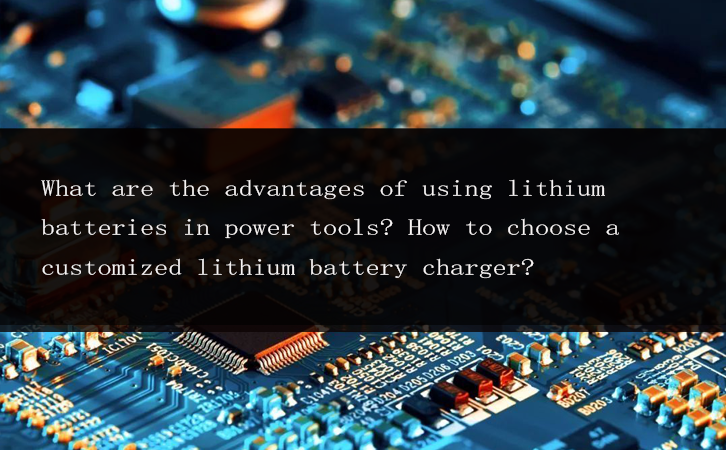Information Center
What are the advantages of using lithium batteries in power tools? How to choose a customized lithium battery charger?
Published:2024-10-31 17:08:41 Author:admin Views:12
The adoption of lithium-ion batteries in power tools boasts several notable advantages compared to traditional batteries or fuel-powered engines:
Durability: Lithium-ion batteries typically have a lifespan of 500 to 1,000 charging cycles, significantly longer than the 100 to 200 cycles of conventional lead-acid batteries, thereby extending the service life of power tools.
Lightweight: Lithium-ion batteries weigh approximately 40% less than lead-acid batteries of the same capacity, contributing to reduced weight of power tools and enhanced operational convenience.
High Energy Density: Lithium-ion batteries offer more than double the energy density of lead-acid batteries, meaning less power is required for the same working period, enhancing work efficiency.
Low-Temperature Performance: Regular lithium-ion batteries can discharge at temperatures as low as -20°C, while lead-acid batteries require -40°C for normal operation, highlighting lithium-ion's superior performance in cold environments.
Environmental Friendliness: Lithium-ion battery-powered tools significantly reduce exhaust emissions and noise pollution, contributing to environmental protection.
Economic Benefits: The charging cost of lithium-ion batteries is much lower than fuel costs, and electric tools are generally more durable, saving substantial maintenance and replacement costs. Additionally, electric tools are easy to operate, improving work efficiency and further reducing production costs.
When selecting and customizing a lithium-ion battery charger, the following key factors should be considered:
Voltage Matching: Ensure that the charger's output voltage matches the charging voltage of the lithium-ion battery. Typically, lithium-ion batteries have a charging voltage range of 3.7V to 4.3V, with 4.2V being common, so the charger's output voltage should fall within this range.
Current Compatibility: The charger's output current should be sufficient to fully charge the battery within a reasonable time. The specific current should be determined based on the battery's capacity and charging rate requirements. Generally, for small portable devices, currents of 0.5A to 1A can be used, while larger devices or those requiring fast charging may need higher currents.
Charging Management Features: A good charger should incorporate charging management functions such as overcharge protection, over-discharge protection, and overheat protection to safeguard the battery from damage. These are often achieved through Pulse Width Modulation (PWM) or switching power supply technology.
Charging Rate: Choose an appropriate charging rate based on your needs. Fast charging can replenish the battery to a high level in a short time but may affect battery life; slow charging is more beneficial for battery longevity but takes longer. Therefore, when selecting a charging rate, weigh the balance between charging time and battery life.
Interface Compatibility: Ensure that the charger's output interface matches the charging interface of the lithium-ion battery. Common lithium-ion battery interface types include USB, Micro-USB, and DC input. When selecting a charger, confirm that its interface is compatible with the purchased battery's interface.
Brand and Quality: Opt for chargers from reputable brands with good reputations to ensure safety and performance. Avoid overly cheap products as they may lack necessary protective features and high-quality materials.
In summary, power tools equipped with lithium-ion batteries offer numerous advantages, and when selecting and customizing a lithium-ion battery charger, one should comprehensively consider factors such as voltage matching, current compatibility, charging management features, charging rate, interface compatibility, and brand and quality.
As a manufacturer dedicated to providing high-quality kitchen appliances, choosing the right power adapter for your rice cooker is crucial to ensuring product s···
As a manufacturer of all-in-one desktop PCs, the power adapter serves as the "invisible guardian" of stable device operation. It must not only precise···
IntroductionGolf carts serve as vital transportation tools on golf courses, and their performance and reliability are crucial for enhancing player experience an···
The battery pack is the heart of a golf cart, silently powering every acceleration and climb on the green. However, battery degradation often goes unnoticed, mu···





